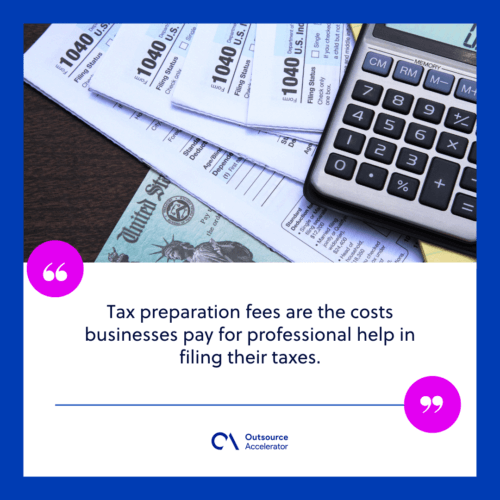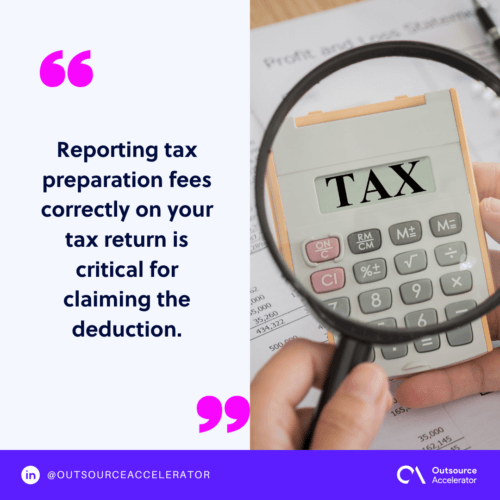Can you deduct tax preparation fees? Smart tax strategy for businesses

Businesses are legally required to fulfill their tax obligations, and noncompliance can lead to fines and legal consequences. Beyond avoiding penalties, maintaining proper tax compliance is essential for building financial credibility.
Tax preparation is a key part of this compliance process. Accurately filing business taxes requires professional expertise, which often comes at a cost. But can you deduct tax preparation fees, and if so, what are the rules for claiming them?
This blog post guides you through everything you need to know about deducting tax preparation fees.
What are tax preparation fees?
Tax preparation fees are the costs businesses pay for professional help in filing their taxes. They are the costs of hiring accountants or tax specialists to complete business tax returns.

What qualifies as a deductible tax preparation fee?
Contrary to the above statement, not all tax-related preparation fees qualify for deductions. The expenses must meet specific criteria depending on your business type.
Self-employed individuals
Can you deduct tax preparation fees as a self-employed individual? You can only deduct tax preparation fees directly related to your business filings if you are self-employed, whether as a sole proprietor, independent contractor, or freelancer.
These deductible expenses may include:
- Preparation of Schedule C (Profit or Loss from Business)
- Accounting services for tracking business income and deductions
- Fees for electronically filing business-related tax forms
However, any portion of the tax preparation fee that applies to individual tax filings is not deductible.
Let’s say you own a small landscaping business as a sole proprietorship and generate $120,000 in annual revenue. Then you hire an accountant and pay $600 for tax preparation services, and the invoice shows:
- $450 for preparing Schedule C and other business-related tax forms
- $150 for preparing your personal tax return
In this case, only the $450 related to your business filing is deductible.
Small business entities
Can you deduct tax preparation fees as a small business owner? Small businesses operating as partnerships, S corporations, or C corporations can deduct tax preparation fees incurred for filing business tax returns.
Deductible expenses include:
- Fees for preparing Form 1065 (partnerships)
- Costs associated with Form 1120 (corporations)
- Tax advisory services for compliance with federal and state tax laws
- Preparation of payroll tax filings
For instance, you run a small S corporation with five employees and generate $300,000 in annual revenue. Then, you pay an accountant $1,800 for tax preparation services.
Since 100% of this amount is directly related to business tax filings, your S corporation can fully deduct the $1,800 as a business expense.
How much of the tax preparation fees are deductible?
The deductible amount depends on your business type and how the fees are divided between business and personal tax filings.
Here are some examples:
- Corporations (C and S corporations). Can deduct 100% of tax preparation fees if they only apply to the business. Example: A C corporation pays $3,500 for tax preparation. The entire $3,500 is deductible.
- Partnerships. Can deduct only the portion related to the business tax return. Example: A partnership pays $2,800, but $600 is for partners’ personal tax payment. Only $2,200 is deductible.
- Sole Proprietors & Self-Employed. Can deduct only the part related to business filings. Example: A sole proprietor pays $900, but only $650 is for business taxes. The $650 is deductible.
Always separate business and personal tax preparation costs and keep records for proof.
IRS guidelines on claiming deducted tax preparation fees
It’s important to understand that deducting tax preparation fees doesn’t mean you’ll get a direct refund for those expenses. Instead, you deduct them from your taxable income when filing your tax return.
Here’s how the deduction affects your tax payment:
- Reduce taxable income – The IRS subtracts the deductible amount from your total income, decreasing the amount subject to tax.
- Lower tax bill – If you owe taxes, the deduction helps lower the amount you need to pay.
- Affect refund (If eligible) – If you overpaid taxes throughout the year, the deduction may slightly increase your refund.
Where to report tax preparation charges on tax returns
Reporting tax preparation fees correctly on your tax return is critical for claiming the deduction. Businesses should record these expenses under the appropriate section:
- Sole proprietors report tax preparation fees on Schedule C (Profit or Loss from Business), Line 17 under “Legal and professional services.”
- Partnerships file Form 1065 (U.S. Return of Partnership Income) and report tax preparation fees under “Other Deductions” on Line 20.
- C corporations use Form 1120 (U.S. Corporation Income Tax Return) and report tax preparation fees under “Other Deductions” on Line 26.
- S corporations file Form 1120S (U.S. Income Tax Return for an S Corporation) and deduct tax preparation fees under “Other Deductions” on Line 19.

So, can you deduct tax preparation fees?
Can you deduct tax preparation fees? The answer is—yes. But as discussed above, there are rules to follow and to qualify.
There are only two things to remember: Only the portion of the expenses directly related to business tax filings qualifies for a deduction, and any amount spent on preparing personal tax returns cannot be written off.
To support your deduction, keep detailed receipts and invoices from your tax professional that clearly show:
- Services provided
- Fees charged for each service
- Date of service
- Business purpose
If your tax preparation fees cover both business and personal matters, ask for guidance from a tax professional to provide an itemized invoice separating the costs. This documentation helps justify your deduction in case the IRS questions it.







 Independent
Independent




